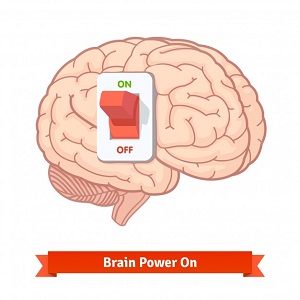My key to dealing with stress is simple: Just stay cool and…

Your Mind on Mindfulness: How It Works (Pt. 1 of 2)
2.
Your Mind on Mindfulness: How It Works (Pt. 1 of 2)
There cannot be a stressful crisis next week.
My schedule is already full.
Henry Kissinger
Perhaps you’ve heard of the legendary American statesman, Henry Kissinger. Widely known in his day for the wise witticisms that peppered his international diplomacy, he always appeared suave and in control.
Wouldn’t we all like to possess that attractive trait — to be unnerved by the stress of work demands, family responsibilities, and social pressures. To be in control of our response to external stress. To handle it and make it work for us, not against us.
In other words, to be in control of your mind.
We don’t know Mr. Kissinger’s trick but we do know this: To be in control of your mind, you need to be aware of your mind. You can gain self-awareness with the proven practice of Mindfulness.
In this post, you will learn:
- What is a mindfulness mind?
- How can mindfulness help you conquer stress?
- What are the first 4 steps to developing a mindfulness mind?
Rooted in ancient spiritual practices of Buddhism and Hinduism, mindfulness today is a common secular practice throughout Western society.
Schools, business corporations, hospitals and many other institutions teach mindfulness. In all cases, it effectively improves one’s mental, emotional and physical well-being.
Mindfulness dissolves stress because it helps:
1) quiet the mind
2) improve a person’s understanding of his own thoughts and emotions.
In relation to daily life and work, these benefits re-orient one’s mindset and patterns of thought. The result is improved focus, creativity, and productivity.
The underlying practice of the mindfulness mind is conscious thinking, or self-awareness at all times.
Yes, at all times. No, it not distracting. Mindfulness is a subtle sense of your emotional, mental, and physical presence whatever you are doing.
Mindfulness vs. Mindlessness
The tedium of daily routines often drives us to operate on “autopilot”. In this way, we somehow manage to complete our tasks with minimal conscious thinking. It’s easy, habitual, passive – and seemingly unstressful.
However, autopilot functioning separates us from our conscious minds. It is like being out of touch with ourselves. Autopilot allows us to fall prey to less regulated reactions. This can be mental and emotional distress over a trivial matter. However, it can extend further to outward expressions such as impatience and irritability. Mindless reactions often give rise to stress to the individual and those around him.
Autopilot functioning can keep you stuck in stress. Over time, this is chronic stress. Here are two examples.
How does “autopilot” thinking cause stress?
A minor annoyance: Are you ever bothered by unsolicited, unwelcome telemarketer calls?
 A common autopilot response might be a disgruntled remark and quick hang-up, driven by the disturbing thought that someone is stealing your time. Yet the discomfort, tension, and stress of this reaction generate unnecessary waves of stress for both you and the caller.
A common autopilot response might be a disgruntled remark and quick hang-up, driven by the disturbing thought that someone is stealing your time. Yet the discomfort, tension, and stress of this reaction generate unnecessary waves of stress for both you and the caller.
A potentially major problem: Walking or driving while zoned out on autopilot, you may not even notice the world around you or the obstacles in front of you.
In both cases, people tend to believe these are normal acceptable ways of reacting to situations and surroundings. However, the build-up of apathy, negativity, or mindlessness is the backdrop for resultant chronic stress.
In our last post, Stop Mental Stress, we gave a short little exercise on how to delete negative responses from your mind.
At this time, we are going beyond the immediate fix. We are going into the deeper programming of your mind to reverse the trend of negativity and autopilot functioning.
As mindfulness becomes a daily practice and habit, you will naturally be able to avoid potentially stressful situations. You will become calmer, more self-aware, and more in control of your reactions.
The Mindfulness Mind: How to Make It Work for You
The greatest weapon against stress is
our ability to choose one thought over another.
William James
These are the essential mindsets that will enable to make mindfulness a meaningful practice in your daily life. Developing them may take some time, but the experience at every stage is rewarding.
Mindset #1: Turning Within
Responsibilities, obligations often can seem overwhelming. They devour our time, attention, and our minds.
We allow the outer world to consume and control us. But what is happening to our inner lives?
Continual attention to the outer world can cause our inner life to starve due to lack of nourishment. Our thoughts and emotions become imbalanced. As a result, we feel exhausted, frustrated and even angry at the world.
To remedy this imbalance, it is necessary to turn within. Everyone must take refuge from the outside world by turning to their in the inner world.
With your mindfulness mind, you become more aware of what’s happening on the inside while you continue to manage your life on the outside.
In doing so, you will become more aware of your thoughts and feelings. This will enable you to transform yourself into a calm and impartial evaluator of the outside world.
Do you see how this demeanor and self-awareness can dissolve stress and positively affect your work performance?
Mindset #2: Developing HyperFocus
Hyper-focus is a powerful mental skill that focuses consciousness on a single subject, or topic or task. It helps to clear away thoughts and distractions that race through minds and interfere with performance.

Performers, writers, painters and all manner of artists have a natural knack for developing hyper-focus.
When your mind becomes completely absorbed in the task at hand, you are hyperfocusing. No distractions, no racing thoughts – just pure, blissful focus that will allow you to complete your tasks with ease and efficiency.
In Eastern spiritual practices, such as Buddhism, hyper-focus enhances the practice of meditation. We can appropriate this same technique to help you curb any distractions, so you become more efficient and productive. Because it intensifies concentration, hyper-focus helps you bring out the best in yourself.
Mindset #3: Being Self-Aware at All Times
As with any new skill you wish to master, you must practice mindfulness whenever you can.
This is what I do: While I’m involved in some activity I remind myself to be more aware and mindful of what’s happening inside. It’s like flipping a switch on in my brain. Then a quick self-check gives me a good sense of how I’m feeling mentally, emotionally, and physically. For a list of manifestations of stress that you might overlook at any given moment, click here.
As you become increasingly mindful, you start to discover the patterns of thought and emotions that drive your outer expression. This is a major step in reprogramming yourself to improve your well-being.
Mindset #4: Focusing on the Moment
This skill requires that all your thoughts and energy focus only on what is presently happening. The Eastern spiritual masters describe this as “being in the moment”.
The ability to consciously turn our focus to the present moment is an extremely challenging, especially to people in the Western world.
Yet people experience total attention to the present moment all the time without realizing it. For example, if you are engrossed in an activity, like reading a good novel, you can be oblivious to the passing of time. Writers and musicians can practice their art for a whole day with moment-to-moment focus, not even thinking about eating or being tired.
Focusing on the present moment means no thought or feeling whatsoever of anything in the past or anything in the future. It’s like your escape, not out of but into reality.
Your skill of hyperfocus (#2 above) prepares you and facilitates this super hyperfocus on the present moment.
The Western society’s challenge with the experience of being in the moment is heightened by the value it places on multi-tasking. This is the antithesis of the mindfulness mind. Moreover, the ability to do many things at the same time is not necessarily a natural and healthy way to use our minds.
Scientists have even stated that our minds are not “wired” for multi-tasking. We really can only focus on one thing at a time.
Our brains selectively activate, or “light up” specific regions to carry out designated tasks. Our centralized focus dissipates when we multi-task, activating different regions of the brain corresponding to the tasks. It’s as if our brains light up like Christmas lights.
This strains the brain and renders focus extremely difficult. Stressed people, pulled in different directions, tend to be easily distracted and on edge.
The Takeaway:
Mindfulness helps you to be self-aware and in control of your mind. It helps you maintain calmness and focus so that you complete the task-at-hand to the best of your ability. This is how your mindfulness mind can remove the element of stress and improve your performance inside and outside of your workplace.
Next, we will reach into powerful, situational applications of mindfulness. Continue to Part 2 of this series to learn how to use mindfulness to keep negative stress at bay and even eliminate it. See you there.
Question to Ponder …
Do you ever feel like you’re on the outside looking in — into yourself?
Leave a comment below, or just Say Hi.
By the way, be sure to access your FREE E-Guide

10 Stress Habits and Alternatives!


trang điểm cô dâu
I like what you guys are usually up too. This type of clever work and
coverage! Keep up the superb works guys I’ve incorporated you guys to my own blogroll.
Very good info. Lucky me I ran across your blog by accident
(stumbleupon). I have bookmarked it for later!
I’m really enjoying the theme/design of your blog.
Do you ever run into any web browser compatibility issues?
A handful of my blog audience have complained about my site
not operating correctly in Explorer but looks great in Opera.
Do you have any recommendations to help fix this problem?
Excellent post. I was checking constantly this blog and I am impressed!
Very useful information specifically the last part 🙂
I care for such information a lot. I was seeking this particular info for a long time.
Thank you and best of luck.
I like the helpful information you provide in your articles.
I will bookmark your blog and check again here frequently.
I’m quite sure I will learn plenty of new stuff right
here! Best of luck for the next!
Hi, after reading this remarkable piece of writing i am as well happy
to share my experience here with mates.
Also visit my website: MerriGDarras
Nice blog here! Also your web site loads up fast! What web host are you using?
Can I get your affiliate link to your host? I wish my site loaded up as fast as yours lol
thủ thuáºt trang Ä‘iểm cho cô dâu có khuôn mặt vuông